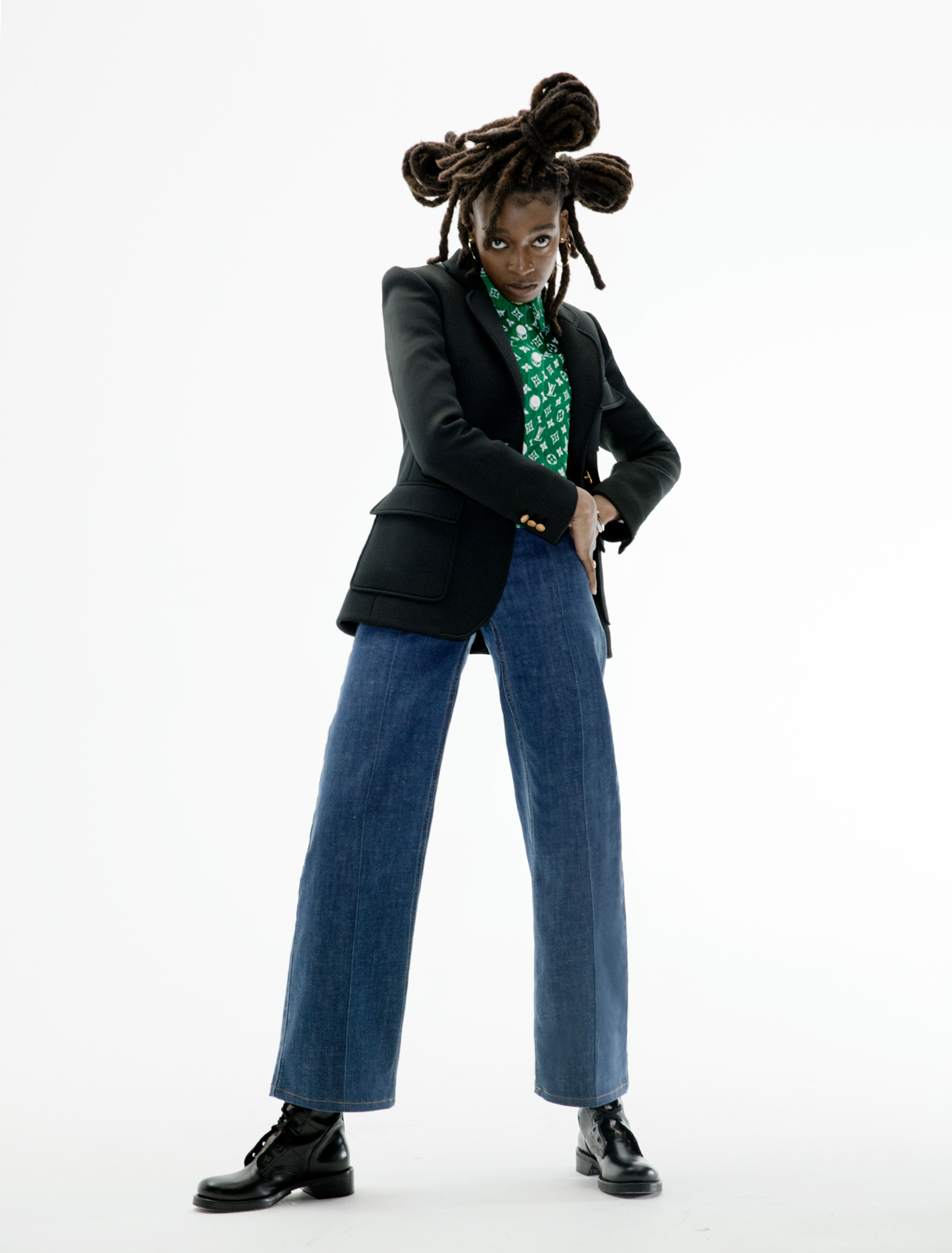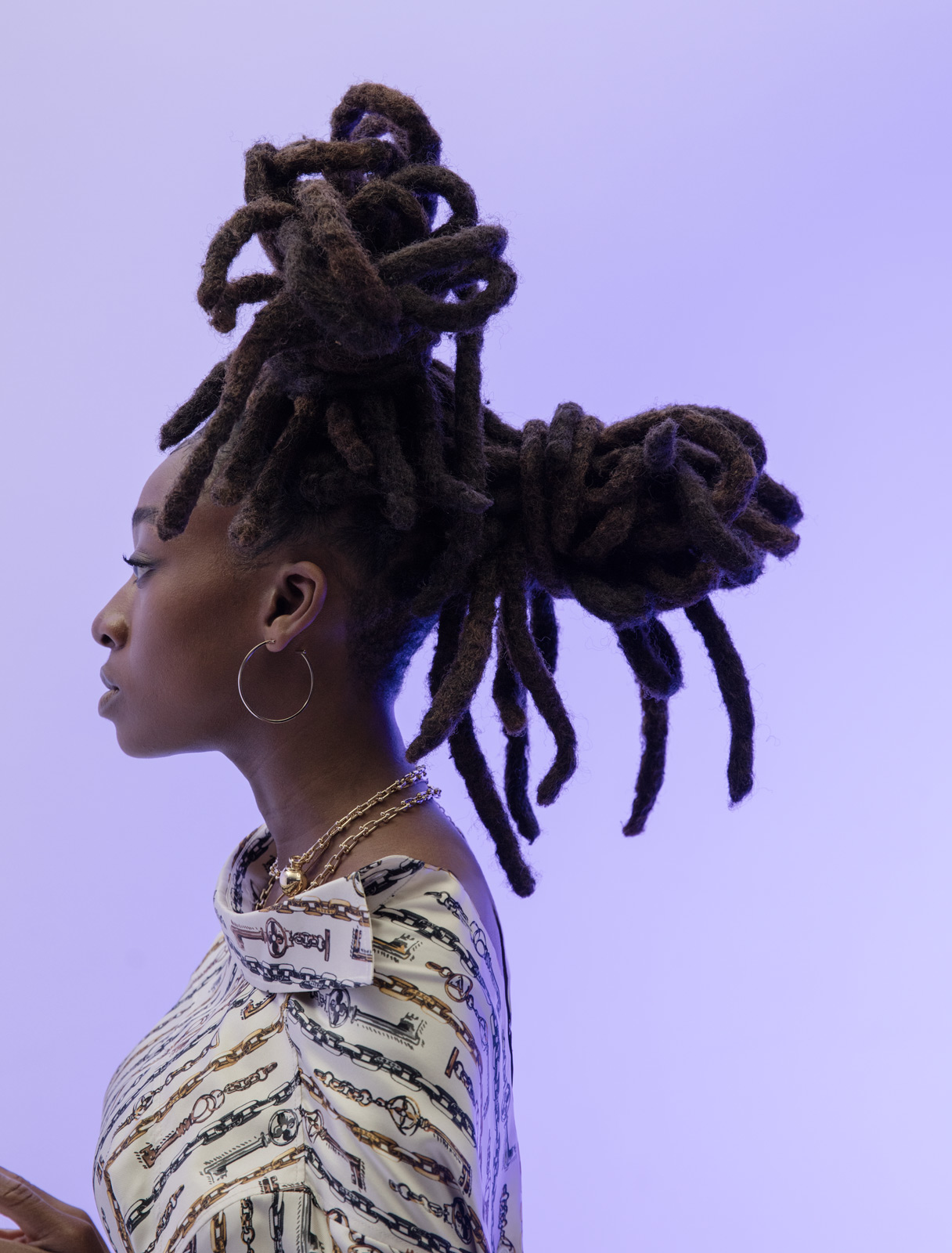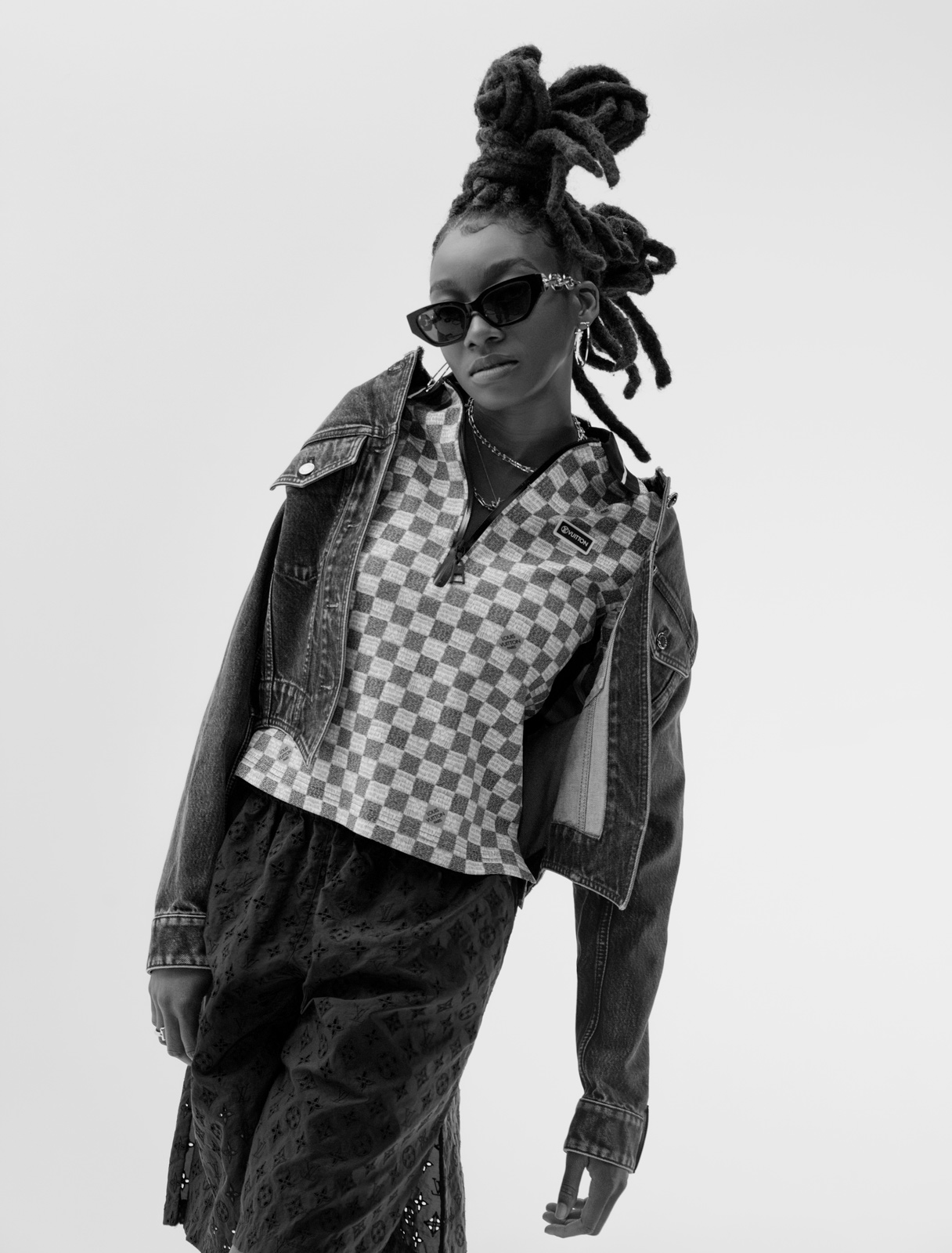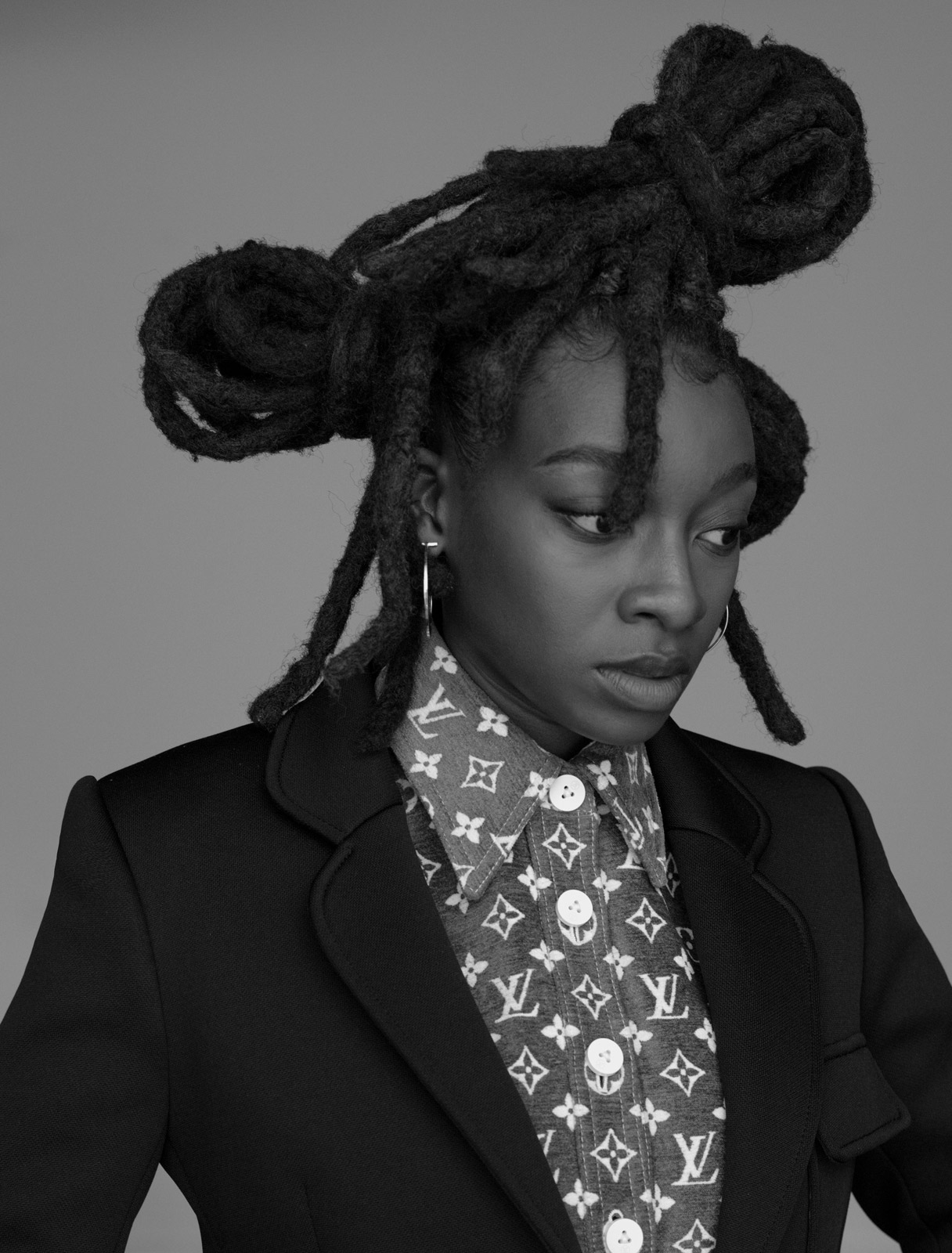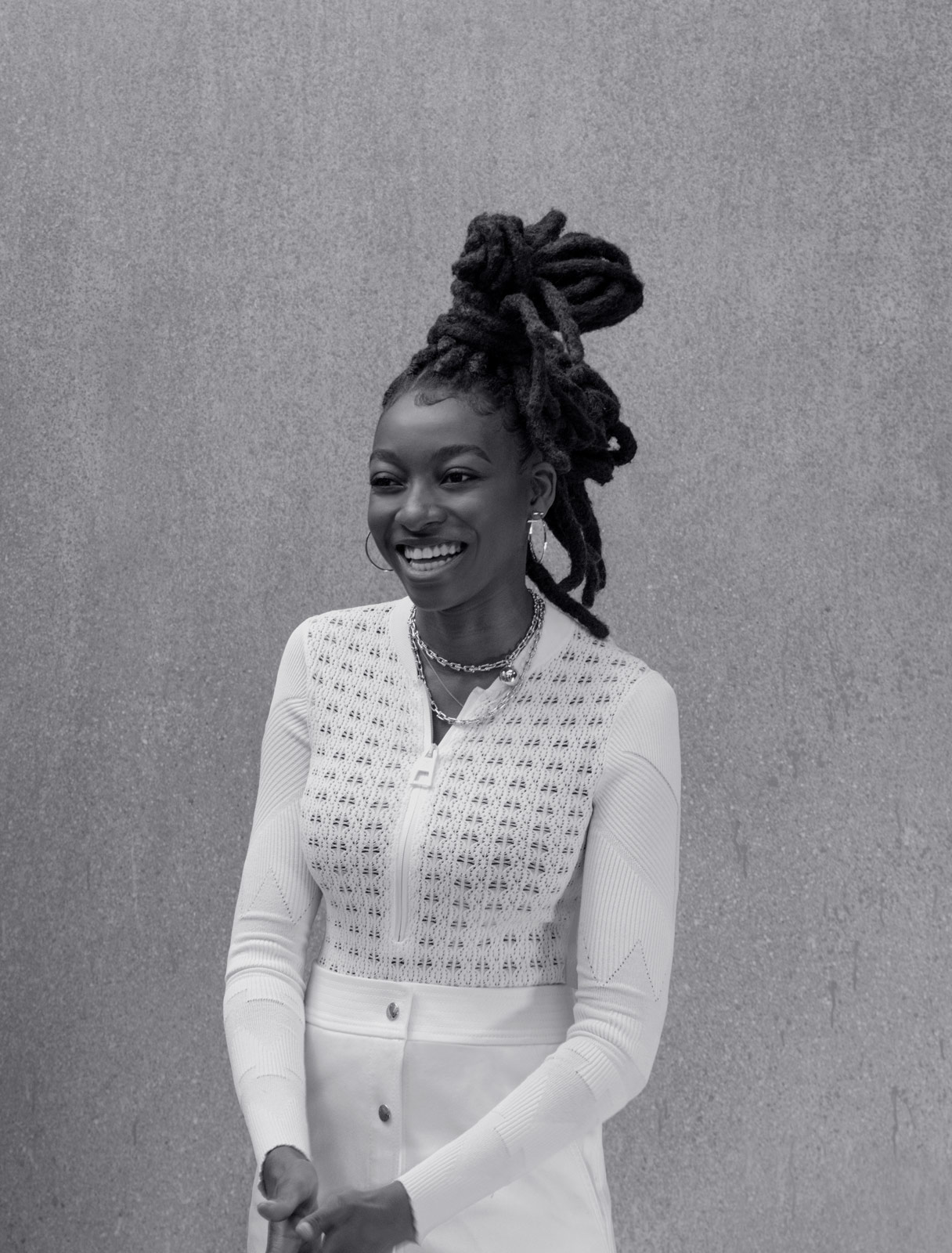
For Document’s Tenth Anniversary issue, the London-based rapper joins Document to discuss leveling up and using her talent for the greater good
“I’m entitled to live my life,” Little Simz told me towards the middle of our call. She was driving through the UK as we spoke, and I was stationary at my desk in New England, five hours behind her. I gathered that she was on her way to spend time with family. Much of our conversation brought to mind what I’d come to know from other writings on the rapper and her music: Though she often puts her inner world and life on display in her verses, this display is still a crafted one—and Simz is insistent, admirably so, about maintaining the distinction between her public and personal lives.
The London-born rapper’s fourth and most recent album, Sometimes I Might Be Introvert (which shortens to an acronym of her nickname, Simbi), was released last September to much acclaim, and it sees her wielding full lyrical power. Asked about her relationship to lyricism, she ruminated, “Words are very powerful. When you say, ‘I love you’ or ‘I hate you,’ they have a frequency. Those phrases have a vibration,” which brings to mind a song from the album, aptly titled “I Love You, I Hate You.” In it, she raps about her relationship to her father, who was not around for most of her life. In interviews, she has made it clear that while her father is embedded in the song, it’s first and foremost a reflection on herself rather than a reproach of him. And while in recent years, Simz has received praise from the likes of Kendrick Lamar, J. Cole, Stormzy, and Lauryn Hill—along with accolades from the BRIT Awards and NME Awards—Simz is most proud, with this most recent album, of having made something that lets her stand fully in her own truth.
Just a few weeks before we spoke, Simz announced the cancellation of her US tour, citing the financial stresses of touring as an independent artist. Her friends and fans alike, she told me, have been supportive of the decision—and, as she noted in the announcement, she has future projects in the works, and not just ones in the realm of music. The rapper joined Document to discuss the art of storytelling, delivering difficult decisions, and working with people who want to level up and do weird shit.
Imani Elizabeth Jackson: I want to ask how you’re feeling about your latest album. You got a lot of acclaim for it—I saw it listed in a lot of places as being one of the best albums of 2021. As we get further out from that release, how [have] you been feeling about the project’s success?
Little Simz: I’m super proud of the album, I put a lot into it. I distilled a lot, I channeled a lot, I tapped into places that I hadn’t really gone before. The acclaim is great, but I’m more proud of me for getting out everything I wanted to say gracefully—and standing in my truth. That’s maybe why people connect with it and can relate to it. The music speaks for itself, I think.
Imani: I’ve read a few interviews and profiles on you where there’s some little line about you being a private person, and [whoever’s writing it will] put that in contrast with the music and talk about how the music is really personal. I think there’s even one quote of you talking about your music being a dialogue with yourself. I’m interested in that contrast.
And I recently saw something where you were talking about your acting in Top Boy, and that character being a place where you can channel the stories of other people you know. What do these forms—acting and music—do for you? What are the distinctions between those forms and how do you go about those different types of expression?
Little Simz: I’ve always written from a very personal, introspective place. I don’t really know anything else. It’s not something I consciously think about. It’s what I feel, it’s what I think, and that’s it, you know? I’m just blessed [laughs]. With acting as well, it depends on the role, and it depends on the person and what I feel I need to tap into, or what I need to draw from. But they’re both storytelling in some way, shape, or form. That’s what I love most about both of them: the fact that I can tell a story, [either] my own or [from] someone else’s perspective. I love storytelling—what that brings, who that can inspire, people seeing themselves in people, humanizing people. I believe that my life is already on display through my art, but anything outside of that, I’m entitled to have for me. Because it’s actually my real life. To someone else it’s like, ‘Yeah, cool, I’ll listen to the album and whatever,’ but I live with this. I’m very protective over it and over myself. I feel I need to be.
“I’ve always written from a very personal, introspective place. I don’t really know anything else. It’s not something I consciously think about. It’s what I feel, it’s what I think, and that’s it.”
Imani: I’m a poet and I read a lot of poetry—and there’s this American poet Shane McCrae who [has] talked about how the specific poetic forms that he uses open something up for him to talk about things that would be hard [to talk about] in everyday conversation. I was thinking about the specific genre again, and [how] having this set form around your storytelling lets you be really expressive in a public way. You don’t have to be quite as protective over it. I mean, you still do, but it’s a different kind of interaction with the public.
Along those lines of being protective of your space, your time, and your privacy, I want to ask you about the US tour. I really admire that you decided to cancel it—it’s important that more artists feel able to say no in situations where there’s a lot of pressure and expectation. I was really appreciative [of how], in your note about the cancellation, you talked about the mental toll that it would have taken to do the tour at this moment. Can you talk about navigating that decision, and about making financial decisions in general as an independent artist, particularly as a Black woman?
Little Simz: It’s not something I want to go too deep into, because it’s very personal. But it’s important for artists to recognize their worth. It’s easy to be made to feel like your name is the one that’s going to be tarnished. When making decisions, it’s important to just protect yourself. And I haven’t always gotten it right, you know what I mean? Throughout my career I’ve made decisions that weren’t the best. Obviously, I’m learning, you don’t make the same mistake twice. But I’m growing, being independent. I’m just getting better at my decision-making and really looking out for Simbi. I understand that people want to see me perform—I want to see me perform [laughs]. I know my shows are fun and exciting and people love the music. I appreciate all of it. I always say, there was a time, [and] it wasn’t this for me. It’s heartbreaking—this is not how I expected it to go, you know? But I’m also very grateful that the support has been amazing, because it’s risky. I didn’t have to be that honest about why I’m making that decision, but I felt like I owed it to people to say my truth. And I’m not the only person that this has happened to. I understand that people deal with things in silence, and that’s cool, but I felt that I owe it to people to be honest about why I’m making this decision and express that it hurts me as much as it hurts you. It’s not an easy thing for me to do, but no one is living this truth apart from me—the perspective, it’s different, you know?
I’m just really grateful [for] how the news was received. I didn’t know if people were going to be pissed. People were upset and whatnot, but I think it was more, ‘We got you, whenever you come back we are here. Do your thing, take care of yourself.’ When you build that relationship with your fans or people who invest in you, it’s really special. That’s what I talked about earlier, about humanizing people, because I feel they humanized me in that moment when I was dealing with this pressure. They made me feel like, ‘We get it, you’re one person.’ I wasn’t trying to pull anything at the last second, I was like, ‘Okay, I’m presented with the information, I have to think fast,’ you know? I don’t want to get to America and then shut it down. I think I’ve done all I could with the space and time I was given.
“It’s important for artists to recognize their worth. It’s easy to be made to feel like your name is the one that’s going to be tarnished. When making decisions, it’s important to just protect yourself.”
Imani: What are some other ways that you maintain your freedom and flexibility in your practice—with music, acting, and other endeavors that you have?
Little Simz: I’m not afraid to live my life, and I think that more success, or whatever you call it, can force you to be a bit of a recluse. I understand that, but in the same breath— as much as I like being in the house and being outside—I know I can’t go places and [expect to be] alone. How I feel when I’m out with my family—I’m very nice about it, but I’m with my parents, you know? It’s not being afraid to be that way and learn that I’m entitled to live my life. I’m entitled to my privacy. I’m not a mean person, it’s cool, it’s chill. [But] I’d much rather just chat with you for a minute then let you take a photo. I’m not afraid to be outdoors. I am an artist, I’m always looking for inspiration, and you’re not always going to get that in the house. So I like to spend time with my friends. I play tennis—I’m a very active person, I like sports. I do things that genuinely fuel me and make me happy outside of my work, and, without me even knowing, it really inspires my art. I try not to get caught up in what you’re supposed to do now that you’ve got success or whatever. And I’m very grateful for everything, but in the same breath, if I didn’t have anything to talk about, no one would care about me— apart from my real, immediate people, you know? There’s a reason we’re on the phone right now, and it’s because I’m Little Simz and I’ve created something and put it into the world. I’m mindful of living my life for me, because music is the love of my life. I want to make music and I enjoy making music, and that urge comes from being me.
Imani: I kept seeing this quote floating around—I think it was from Lucille Clifton—about what you’re saying. Poetry was her life in a sense; but also, she’s a much more multifaceted person than just this celebrity poet. It’s important to remember that, and that life feeds the work. Work doesn’t feed your life.
Little Simz: Exactly, yeah.
Imani: So all of your work is collaborative by necessity. I’m not even talking about features and things like that, but down to the production. Any time you’re making a music video, for example, that’s always going to require all these different types of dialogue and connection. How do you go about choosing who your creative collaborators are?
Little Simz: Everyone I’ve worked with I’ve known for a very long time, and even that in itself is special, because you’re all working towards the same goal. We’re just aligned, and they’re also very trusting of my vision. When it comes to artwork, or anything encompassing creative direction, I can hand it to Jeremy Cole—who I have worked with for a very long time—and he’ll get it. But he’s also not afraid to be pushed, challenged, and stretched, which is important. I think I’ve always wanted to work with people who are not comfortable and who want to level up, because I want to level up; I want to grow and be my ultimate self— and you need help to be able to do that. It’s great to be able to work with people who are down to push the boundaries and do weird shit. When you’re doing what everyone else is doing… I don’t know how you grow like that. I like to work with people who are here to help innovate. It inspires me, it wows me, it makes me feel charged.
Imani: And you feel like, as much as you challenge and push them, they do the same for you?
Little Simz: A hundred percent. But you need trust to be able to do that.
“I’m mindful of living my life for me, because music is the love of my life. I want to make music and I enjoy making music, and that urge comes from being me.”
Imani: For sure. Can you talk about if or how poetry informs your work and your outlook on life in general? Is that a big anchor for you?
Little Simz: Words are very powerful. When you say, ‘I love you’ or ‘I hate you,’ they have a frequency. Those phrases have a vibration. I’ve always understood that I have a gift for delivering words, which I think is a power, and I’m mindful of how I use that power. Do you use the power for the greater good? How are you using this gift that you’ve been given? I always felt like I was using it for good, you know what I mean? When I write something that can relate to someone, that can help someone—but also it makes me feel good. It’s a release in me, it’s an enjoyment. Throughout my life and career, [I have to be] self-aware enough to understand how I’m using my power. I’m not naïve enough to think this can’t get taken away from me at any minute, because there are days I go in the studio, and I ain’t got it. So it can get turned off real quick if it’s not used correctly. I’m just very mindful about it. And also, I am a genuine lover and fan of music. When I hear some of my favorite artists or poets, I know what it’s like to be the one delivering, and I also know what it’s like to receive. I’ve heard songs that make me cry, that give me goosebumps, [that] get me pumped, give me something active. I know how powerful music is. I’m mindful of what I’m putting out, and I want to use my gifts for the right reasons—love, essentially. I just want to do things with love, out of love. It’s not that complicated for me.
Imani: I know I said that was the last question, but something you said also made me want to ask about your process. Do you write every day? Do you have some sort of set routine around how you’re creating your music? Or is it more that it happens when it happens for you?
Little Simz: I get bursts where I can’t take my pen off the page. It’s flowing, and everything has weight. And sometimes it doesn’t, but those moments [are] when I say, ‘Okay, cool, I need to live my life.’ I don’t stress about making music, because I already do this. I’m just aware, because of how my stuff is, and my creative process, and the type of music I make—it does require me to live my life. I journal as well. It’s not anything lyrical or poetic, but when I read over it, it is nice, because it allows me to visualize, and I like visualizing and putting myself back in places. Yeah, the creative process happens in bursts, I would say. But when it does, I definitely don’t get in the way or try to stop it.
Hair Chantelle Fuller. Makeup Nibras. Photo Assistant Pierre Lequeux. Digital Technician Samuel Hearn. Stylist Assistant Bernadette Da Conceição. Production Director Anthony Chebabo at Chebabo & Co. Production Manager Georgina Orpin at Chebabo & Co. Production Director Madeleine Kiersztan. Talent Director Tom Macklin.


